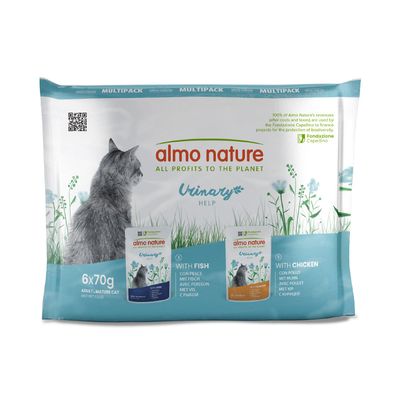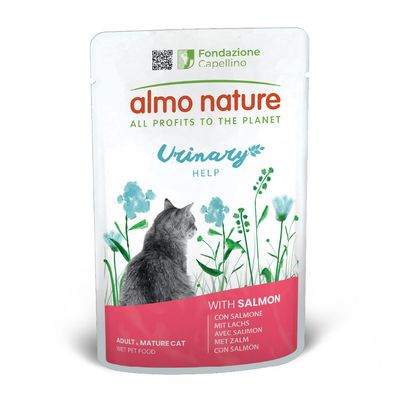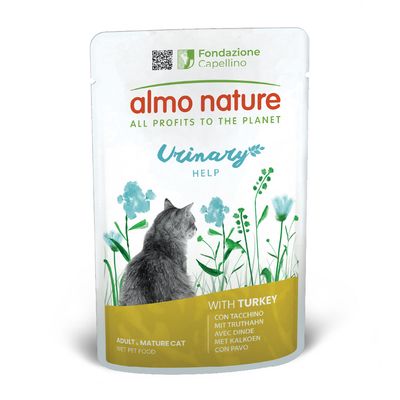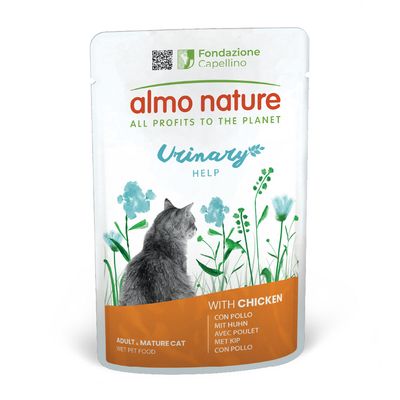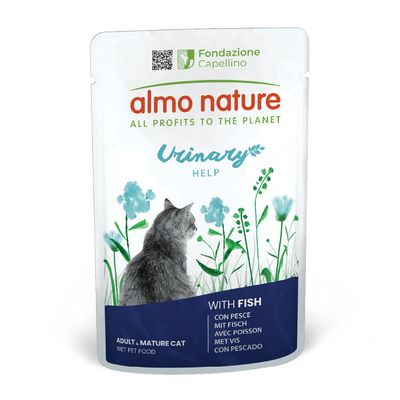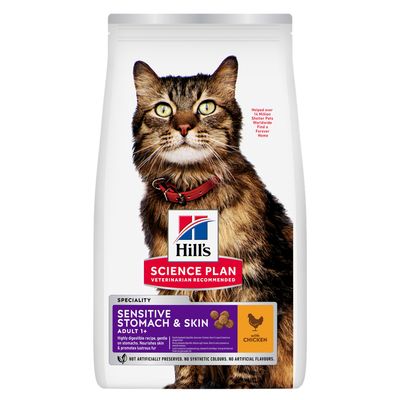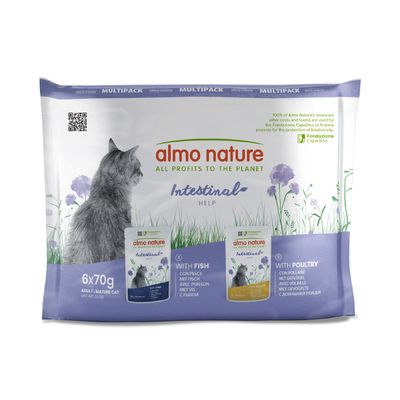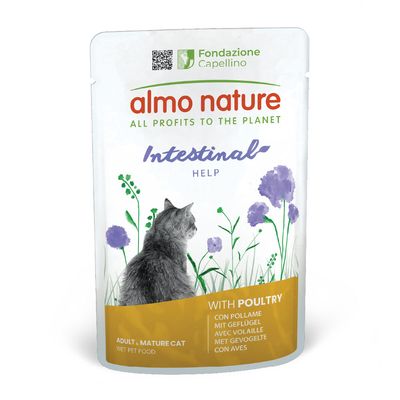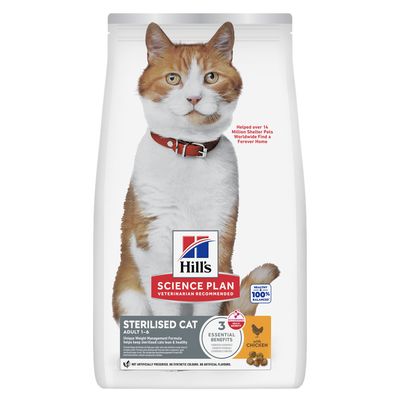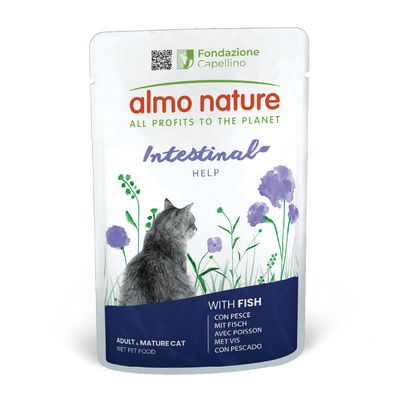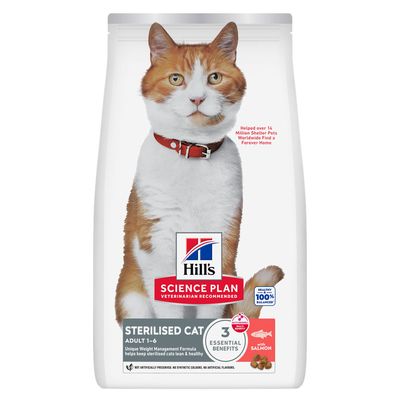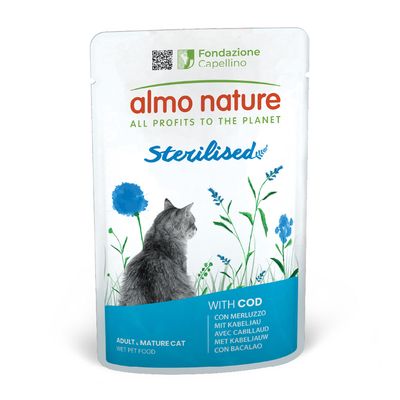Sensitive Cat Food
Veterinarian Dr. med. vet Franziska G. explains: Sensitive Cat Food

"Vets refer to cats that have sensitivities (including allergies) to certain substances and that frequently suffer from digestive problems or skin conditions as ‘sensitive cats’. In nutrition, the word ‘sensitive’ refers primarily to cats with a delicate gastrointestinal system. Food allergies in cats or food intolerance in cats are also referred to as sensitive stomachs.
The symptoms aren’t always easy to recognise at first. Indications include sudden itching, redness or hair loss due to a new food. Affected cats also often show digestive issues or general signs such as tiredness or loss of appetite. Sensitive cat food can support cats with sensitivities."
This content is a translation of the original text published on zooplus.de, created by Veterinarian Dr. med. vet. Franziska G., in collaboration with our editorial team. The information provided is for general guidance only and is not a substitute for professional veterinary advice, diagnosis or treatment. Always consult your vet if you have any concerns about your pet’s health or wellbeing.
Veterinarian Dr. med. vet Franziska G. explains: Sensitive Cat Food

"Vets refer to cats that have sensitivities (including allergies) to certain substances and that frequently suffer from digestive problems or skin conditions as ‘sensitive cats’. In nutrition, the word ‘sensitive’ refers primarily to cats with a delicate gastrointestinal system. Food allergies in cats or food intolerance in cats are also referred to as sensitive stomachs.
The symptoms aren’t always easy to recognise at first. Indications include sudden itching, redness or hair loss due to a new food. Affected cats also often show digestive issues or general signs such as tiredness or loss of appetite. Sensitive cat food can support cats with sensitivities."
This content is a translation of the original text published on zooplus.de, created by Veterinarian Dr. med. vet. Franziska G., in collaboration with our editorial team. The information provided is for general guidance only and is not a substitute for professional veterinary advice, diagnosis or treatment. Always consult your vet if you have any concerns about your pet’s health or wellbeing.
What does "sensitive" mean in cat food?
Sensitive cat food is specially designed for cats with a sensitive stomach or allergies. It usually only contains ingredients that are easy to digest. Sensitive cat food is therefore usually based on selected protein sources that are rarely found in conventional cat food (e.g. duck or insects). Many manufacturers also take care to avoid using artificial additives that could cause irritation as much as possible.
What does "sensitive" mean in cat food?
Sensitive cat food is specially designed for cats with a sensitive stomach or allergies. It usually only contains ingredients that are easy to digest. Sensitive cat food is therefore usually based on selected protein sources that are rarely found in conventional cat food (e.g. duck or insects). Many manufacturers also take care to avoid using artificial additives that could cause irritation as much as possible.
How can I tell if my cat cannot tolerate its food?
The following symptoms will give you an indication that your cat is not tolerating its food:
- Vomiting, flatulence or diarrhoea (within minutes or hours of eating)
- Itching, redness or hair loss
- Loss of appetite up to complete refusal to eat
- Possible change in drinking behaviour
- Tiredness and weight loss
If your cat shows at least one of these symptoms, you should consult a vet.
How can I tell if my cat cannot tolerate its food?
The following symptoms will give you an indication that your cat is not tolerating its food:
- Vomiting, flatulence or diarrhoea (within minutes or hours of eating)
- Itching, redness or hair loss
- Loss of appetite up to complete refusal to eat
- Possible change in drinking behaviour
- Tiredness and weight loss
If your cat shows at least one of these symptoms, you should consult a vet.
Which cat food for sensitive cats?
In addition to sensitive cat food, zooplus also offers other types of food for sensitive cats. These can help to avoid allergic reactions and prevent intolerances:
- Cat food for intolerances with high-quality and selected proteins.
- Single protein cat food and single protein cat snacks with only one source of animal protein.
- Grain-free cat food and grain-free snacks for cats with a grain allergy or grain intolerance.
- Cat snacks for stomach & intestines with a positive effect on the gut flora.
Which cat food for sensitive cats?
In addition to sensitive cat food, zooplus also offers other types of food for sensitive cats. These can help to avoid allergic reactions and prevent intolerances:
- Cat food for intolerances with high-quality and selected proteins.
- Single protein cat food and single protein cat snacks with only one source of animal protein.
- Grain-free cat food and grain-free snacks for cats with a grain allergy or grain intolerance.
- Cat snacks for stomach & intestines with a positive effect on the gut flora.
What food is easy for cats to digest?
Food that is easy for cats to digest refers to sensitive cat food, which ideally consists entirely of easily digestible ingredients and fulfils the nutritional requirements of sensitive cats. In the table below, you will find tips on which foods are easily digestible for cats:
| Tip | Single protein |
|---|---|
| Reason | Monoprotein food with only one protein source reduces the likelihood of your cat showing signs of allergy or intolerance. |
| Tip | Hypoallergenic |
| Reason | Hypoallergenic cat food is free from known allergens and is therefore well tolerated by most sensitive cats. |
| Tip | Gastrointestinal dietetic food |
| Reason | Vets can prescribe special gastrointestinal dietetic food for cats to aid digestion. |
| Tip | Poultry |
| Reason | Gently cooked poultry such as chicken or turkey is considered lean meat that contains little fat. |
| Tip | Grain-free |
| Reason | Some cats have trouble digesting grains due to their difficult-to-digest carbohydrates. |
| Tip | Small pieces |
| Reason | Chopped or puréed cat food is easier to digest, especially for older cats or cats with dental problems. |
Tip | Reason |
|---|---|
Single protein | Monoprotein food with only one protein source reduces the likelihood of your cat showing signs of allergy or intolerance. |
Hypoallergenic | Hypoallergenic cat food is free from known allergens and is therefore well tolerated by most sensitive cats. |
Gastrointestinal dietetic food | Vets can prescribe special gastrointestinal dietetic food for cats to aid digestion. |
Poultry | Gently cooked poultry such as chicken or turkey is considered lean meat that contains little fat. |
Grain-free | Some cats have trouble digesting grains due to their difficult-to-digest carbohydrates. |
Small pieces | Chopped or puréed cat food is easier to digest, especially for older cats or cats with dental problems. |
Ask your vet or nutritionist which of these foods is suitable for your sensitive cat.
What food is easy for cats to digest?
Food that is easy for cats to digest refers to sensitive cat food, which ideally consists entirely of easily digestible ingredients and fulfils the nutritional requirements of sensitive cats. In the table below, you will find tips on which foods are easily digestible for cats:
| Tip | Single protein |
|---|---|
| Reason | Monoprotein food with only one protein source reduces the likelihood of your cat showing signs of allergy or intolerance. |
| Tip | Hypoallergenic |
| Reason | Hypoallergenic cat food is free from known allergens and is therefore well tolerated by most sensitive cats. |
| Tip | Gastrointestinal dietetic food |
| Reason | Vets can prescribe special gastrointestinal dietetic food for cats to aid digestion. |
| Tip | Poultry |
| Reason | Gently cooked poultry such as chicken or turkey is considered lean meat that contains little fat. |
| Tip | Grain-free |
| Reason | Some cats have trouble digesting grains due to their difficult-to-digest carbohydrates. |
| Tip | Small pieces |
| Reason | Chopped or puréed cat food is easier to digest, especially for older cats or cats with dental problems. |
Tip | Reason |
|---|---|
Single protein | Monoprotein food with only one protein source reduces the likelihood of your cat showing signs of allergy or intolerance. |
Hypoallergenic | Hypoallergenic cat food is free from known allergens and is therefore well tolerated by most sensitive cats. |
Gastrointestinal dietetic food | Vets can prescribe special gastrointestinal dietetic food for cats to aid digestion. |
Poultry | Gently cooked poultry such as chicken or turkey is considered lean meat that contains little fat. |
Grain-free | Some cats have trouble digesting grains due to their difficult-to-digest carbohydrates. |
Small pieces | Chopped or puréed cat food is easier to digest, especially for older cats or cats with dental problems. |
Ask your vet or nutritionist which of these foods is suitable for your sensitive cat.
Which food is the easiest for a cat to digest?
Sensitive wet cat food, which is gently cooked, is suitable for many sensitive cats. Usually it contains only one source of protein, is grain-free and contains no artificial additives.
Which food is the easiest for a cat to digest?
Sensitive wet cat food, which is gently cooked, is suitable for many sensitive cats. Usually it contains only one source of protein, is grain-free and contains no artificial additives.
Is wet or dry food better for a cat with a sensitive stomach?
Many sensitive cats tolerate wet food better than dry food. This is due to the comparatively higher water content, which promotes digestion and many metabolic processes.
Is wet or dry food better for a cat with a sensitive stomach?
Many sensitive cats tolerate wet food better than dry food. This is due to the comparatively higher water content, which promotes digestion and many metabolic processes.
Is grain-free better for cats with sensitive stomachs?
Grain-free cat food can be suitable for cats with sensitive stomachs, as their digestive system is not designed to digest grain and it is difficult for them to do so.
Is grain-free better for cats with sensitive stomachs?
Grain-free cat food can be suitable for cats with sensitive stomachs, as their digestive system is not designed to digest grain and it is difficult for them to do so.




